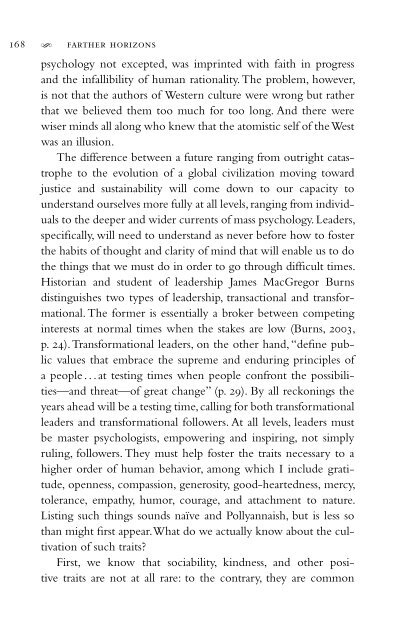Down to the wire : confronting climate collapse / David - Index of
Down to the wire : confronting climate collapse / David - Index of
Down to the wire : confronting climate collapse / David - Index of
You also want an ePaper? Increase the reach of your titles
YUMPU automatically turns print PDFs into web optimized ePapers that Google loves.
S<br />
168 far<strong>the</strong>r horizons<br />
psychology not excepted, was imprinted with faith in progress<br />
and <strong>the</strong> infallibility <strong>of</strong> human rationality. The problem, however,<br />
is not that <strong>the</strong> authors <strong>of</strong> Western culture were wrong but ra<strong>the</strong>r<br />
that we believed <strong>the</strong>m <strong>to</strong>o much for <strong>to</strong>o long. And <strong>the</strong>re were<br />
wiser minds all along who knew that <strong>the</strong> a<strong>to</strong>mistic self <strong>of</strong> <strong>the</strong> West<br />
was an illusion.<br />
The difference between a future ranging from outright catastrophe<br />
<strong>to</strong> <strong>the</strong> evolution <strong>of</strong> a global civilization moving <strong>to</strong>ward<br />
justice and sustainability will come down <strong>to</strong> our capacity <strong>to</strong><br />
understand ourselves more fully at all levels, ranging from individuals<br />
<strong>to</strong> <strong>the</strong> deeper and wider currents <strong>of</strong> mass psychology. Leaders,<br />
specifi cally, will need <strong>to</strong> understand as never before how <strong>to</strong> foster<br />
<strong>the</strong> habits <strong>of</strong> thought and clarity <strong>of</strong> mind that will enable us <strong>to</strong> do<br />
<strong>the</strong> things that we must do in order <strong>to</strong> go through diffi cult times.<br />
His<strong>to</strong>rian and student <strong>of</strong> leadership James MacGregor Burns<br />
distinguishes two types <strong>of</strong> leadership, transactional and transformational.<br />
The former is essentially a broker between competing<br />
interests at normal times when <strong>the</strong> stakes are low (Burns, 2003,<br />
p. 24). Transformational leaders, on <strong>the</strong> o<strong>the</strong>r hand, “defi ne public<br />
values that embrace <strong>the</strong> supreme and enduring principles <strong>of</strong><br />
a people . . . at testing times when people confront <strong>the</strong> possibilities—and<br />
threat—<strong>of</strong> great change” (p. 29). By all reckonings <strong>the</strong><br />
years ahead will be a testing time, calling for both transformational<br />
leaders and transformational followers. At all levels, leaders must<br />
be master psychologists, empowering and inspiring, not simply<br />
ruling, followers. They must help foster <strong>the</strong> traits necessary <strong>to</strong> a<br />
higher order <strong>of</strong> human behavior, among which I include gratitude,<br />
openness, compassion, generosity, good-heartedness, mercy,<br />
<strong>to</strong>lerance, empathy, humor, courage, and attachment <strong>to</strong> nature.<br />
Listing such things sounds naïve and Pollyannaish, but is less so<br />
than might fi rst appear. What do we actually know about <strong>the</strong> cultivation<br />
<strong>of</strong> such traits?<br />
First, we know that sociability, kindness, and o<strong>the</strong>r positive<br />
traits are not at all rare: <strong>to</strong> <strong>the</strong> contrary, <strong>the</strong>y are common
















